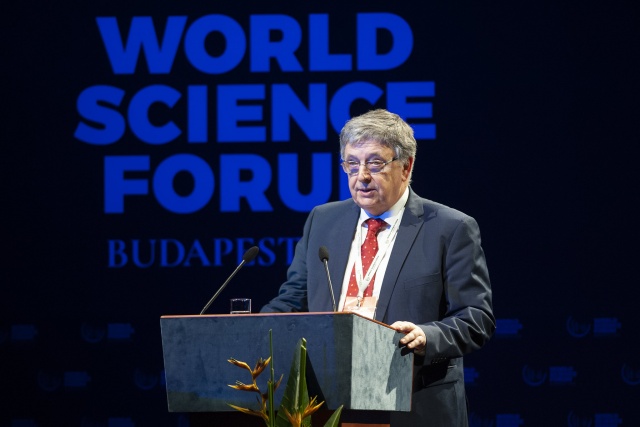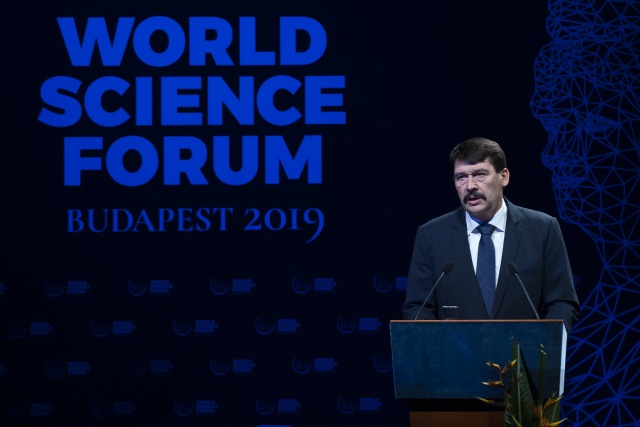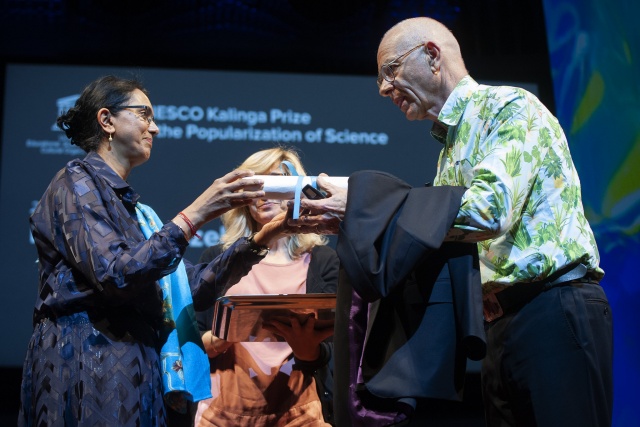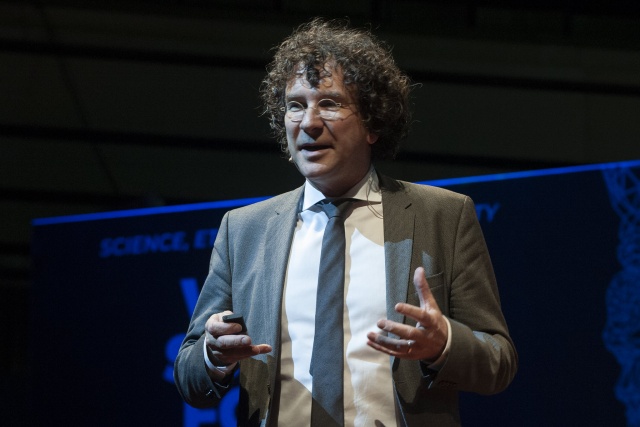Science, ethics and responsibility - World Science Forum kicks off in Budapest
This year's Forum focuses on the ethical problems scientists face and on the responsibility of researchers for the consequences of their scientific results. The organisers wish to consider these important issues in a broad perspective. "When talking about freedom of research we must address questions like: How to share resources between basic research and innovation? How can science funding be made more transparent and just? Why is it so crucial for scientists to take part in the policy making process?" These were the essential messages during president László Lovász's welcome speech.
The World Science Forum (WSF), organized jointly by the Hungarian Academy of Sciences and the most influential international scientific organizations, is taking place again in Budapest this year.
Please click here for the photo gallery of the opening ceremony!Between 20 and 23 of November, scientists, science policy decision makers and the representatives from the scientific press will be arriving in Budapest from over 100 countries. This marks the 20th anniversary of the first conference that launched the World Science Forum. The 1999 interdisciplinary conference organized by UNESCO and the International Council for Science (ICSU) also included in its agenda the problems of the role and responsibility of science, and the ethical questions of scientific research.
Welcome speech delivered by László Lovász, President of the Hungarian Academy of Sciences
Dear Mr President,
Your Royal Highness,
Your Excellencies,
Ladies and Gentlemen,
Welcome to the World Science Forum! It is a great pleasure for me to greet you all again in Budapest. It is such an honour for the Hungarian Academy of Sciences and us Hungarians to host over 1000 scientists, science policy-makers, representatives of international and national science institutions, governments and science communicators from 120 countries this year.
Our programme for the next three days is the joint effort of 150 speakers and moderators, many committed science organisations, and of course most importantly our main partners in the conferences of the World Science Forum: UNESCO, the International Science Council, the American Association for the Advancement of Science, the InterAcademy Partnership, TWAS, the World Academy of Sciences, and the European Academies Science Advisory Council. Your contribution has been the key to this Forum, which we hope live up to the standards of the World Science Forum in Jordan two years ago, which attracted a record number of participants.
 László Lovász, President of the Hungarian Academy of Sciences mta.hu/Tamás Szigeti
László Lovász, President of the Hungarian Academy of Sciences mta.hu/Tamás SzigetiThat last Forum was chaired by Her Royal Highness Princess Sumaya bint El Hassan, and it is my special pleasure to greet her Highness here in Budapest. It is also a pleasure to greet the scientists and distinguished representatives of the Republic of South Africa, which will host the next World Science Forum in 2021, Dr Blade Nzimande, Minister for Higher Education, Science and Technology.
Dear Ladies and Gentlemen,
A new contract between science and society in the 21st century, built on the cooperation of scientists, politicians, leaders of the economy and the media – this was the aim set by the organizers of the UNESCO World Conference on Science, the first intergovernmental meeting to discuss the role of science in 1999. This Budapest event was so successful, that it gave rise to a follow-up conference series; this conference series, organized by the Academy has become the World Science Forum.
I cannot praise enough the wisdom of my predecessors for the launch and for the evolution of this initiative, and the governments that from the last 20 years supported the Academy in this endeavour. The biennial events of the Forum have become one of the most eminent tasks of the Hungarian Academy of Sciences.
Our Dear Guests,
Your host, the Hungarian Academy of Sciences, which is almost 200 years old, has gone through a difficult period since our last Forum. Since this September, our Academy no longer manages its own independent research network. However, we still have numerous tasks:
- to represent Hungarian science both at home and in the international field; to promote research that is outstanding in the Central European Region;
- to ensure the freedom of scientific thought;
- to pass resolutions in the field of science ethics;
- to provide quality assurance in science;
- to prepare decisions for policy makers; to cultivate international relationships.
The most important vehicle for this latter task is the World Science Forum. As shown by our previous conferences, the Forum addresses the hottest topics of the scientific community, and decision makers tend to pay more and more attention to the opinions of researchers. The Forum has been gaining significance steadily in the past two decades.
Dear Ladies and Gentleman,
This Forum focuses on the ethical problems scientists face and on the responsibility of researchers for the consequences of their scientific results. We wish to consider these important issues in a broad perspective. When talking about freedom or research, we must address questions like:
- How to share resources between basic research and innovation?
- How can science funding be made more transparent and just?
- Why is it so crucial for scientists to take part in the policy making process?
When talking about our responsibilities, we must consider issues of proper dissemination of results and of communication of science:
- How to distinguish pseudo-science from scientific methods?
- How do researchers and science communication experts see the situation of Open Access?
- What tasks does science have in reaching the aims set up in the UN 2030 Agenda?
- How can science promote sustainable development?
Let me use this last question to demonstrate how it requires the development of new communication techniques, the use of which are imperative in order to spread and popularize scientific results.
- What limits should we set for carbon-dioxide emission necessary for providing the energy required by the ever-growing population of the Earth?
- How should we communicate climate change, the signs of which are more and more clear?
- How should the press react? Should it communicate a pseudo-equilibrium between the opinion of 97 percent of scientists who consider climate change to be factual and that of the remaining 3%?
- How to demonstrate the consequences, without appearing to state empty threats or describing hopelessness?
There are, of course, several possible answers for the above questions. Even the interpretation of the questions can be subject to a hot discussion, let alone the answers. The World Science Forum’s objective cannot be to provide final, unquestionable answers, but we hope we can contribute thoughts and arguments to the discussion of these questions; a discussion that probably will never end, and perhaps never should.
Our Dear Guests,
I hope this random selection of topics from the rich agenda has demonstrated what complex topics determining the future of humanity we will be discussing here together in the following days. I hope the declaration that will be drafted as a result of our discussions will not only be a short summary of the most important thoughts communicated here at the Forum, but it will also serve as a guideline for policy makers.
Dear Ladies and Gentlemen,
Budapest meets all the requirements for becoming the scientific center of this region. However, our city is also famous for its versatile cultural life. I would like to urge you to use this opportunity and take part in cultural programs besides discussing scientific problems. The organizers of the Forum did their best to offer rich cultural experiences for the participants during these few days.
Have a nice time in Budapest and I hope your stay will be an unforgettable experience, both in terms of successful discussions at the Forum and a pleasant stay in Hungary.
Science is a building we construct together
“Nations do not work in different sciences: we share the building we are mutually constructing. What one begins, the other continues, and ultimately the result can be claimed by all who have contributed to its creation” - said János Áder, President of Hungary, during his welcome speech.
 János Áder, President of Hungary mta.hu/Tamás Szigeti
János Áder, President of Hungary mta.hu/Tamás SzigetiUNESCO Prizes
Australian science writer and journalist Karl Kruszelnicki to receive UNESCO Kalinga Prize
UNESCO Director-General Audrey Azoulay awarded the UNESCO Kalinga Prize for the Popularization of science to Karl Kruszelnicki (Australia).
 Karl Kruszelnicki, Australian science writer receives the UNESCO Kalinga Prize mta.hu/Tamás Szigeti
Karl Kruszelnicki, Australian science writer receives the UNESCO Kalinga Prize mta.hu/Tamás SzigetiAn independent jury selected Karl Kruszelnicki in recognition of his longstanding commitment to fire up people’s curiosity for science and share his passion for the subject. “Dr Karl” has been a science communicator for over 30 years, using television, radio, podcasts, print media, books and social media to make science accessible to all. He is best known for his longstanding collaboration with ABC Radio (Australia) and BBC Radio 5 Live (UK) and for television shows Quantum and Sleek Geeks (both on ABC television).
Convinced that understanding science is essential to empower people, he has published 44 science popularization books, and is generous with his time for public engagements, particularly weekly Q&A sessions with schools around the world.
Dr Karl has university degrees in mathematics and physics, biomedical engineering, as well as medicine and surgery and has worked in all of these fields. He has also studied electrical engineering, astrophysics, computer science and philosophy “to fill in gaps in his education.” He has been the Julius Sumner Miller Fellow at the University of Sydney in the School of Physics since 1995, specifically charged with popularizing science.
The UNESCO Kalinga Prize for the Popularization of Science was created by UNESCO in 1951 thanks to a donation by Patnaik Bijoyanand, Founding President of the Kalinga Foundation Trust of India. Awarded every two years, the Prize is now also sponsored by the Government of India through the Department of Science and Technology, and the Odisha State Government. The laureate receive a $40,000 prize, a diploma and the UNESCO Albert Einstein Medal. The purpose of the Prize is to reward outstanding contributions in communicating science and technology to society.
Ashoka Trust (India) to receive 2019 UNESCO Sultan Qaboos Prize for Environmental Conservation
This year’s UNESCO Sultan Qaboos Prize for Environmental Conservation was awarded to the Bangalore-based Ashoka Trust for Research in Ecology and the Environment (ATREE) in recognition of its socially-just environmental conservation and sustainable development activities, following the recommendation of the international jury of the prize. The award ceremony will be held in Budapest, Hungary, on 20 November during the forthcoming World Science Forum.
 Ashoka Trust (India) receives the Sultan Qaboos Prize for Environmental Conservation mta.hu/Tamás Szigeti
Ashoka Trust (India) receives the Sultan Qaboos Prize for Environmental Conservation mta.hu/Tamás SzigetiThe prize recognizes ATREE for its contribution to participatory approach to improving environmental conservation, applied in its initiative in India’s northeastern Sikkim and Darjeeling regions involving conservation planning and the creation and promotion of sustainable livelihoods. The prize also recognizes significant contributions towards the discovery of new species in the Western Ghats, and exceptional outreach to raise awareness of India’s biodiversity and train environmental leaders.
Ranked among the top 20 environmental think-tanks globally, ATREE is dedicated to the generation of interdisciplinary knowledge, education, and policy for the environment and for socially just development. ATREE also contributes to the conservation of diverse environments throughout India, including the Eastern Himalayas, the UNESCO Nilgiri Biosphere Reserve and the Western Ghats World Heritage Site, Vembanad lake, Kaziranga and Manas National Parks, the grasslands of Kutch, the wetlands of Tamil Nadu and Kerala, and urban landscapes of Karnataka. Allocated every other year, the UNESCO Sultan Qaboos Prize for Environmental Conservation was established through a generous donation by Sultan Qaboos Bin Said Al Said of Oman. Laureates are awarded US$100,000, a diploma and a medal during an award ceremony.
Science, ethics and responsibility
"How to connect ethics to science and technology? Some people even claim that humankind is entering the era of ‘Society 5.0’. After the society of hunter-gatherers, the agrarian society, the industrial society and the information society, we are said to be at the brink of a ‘super smart society’, driven by artificial intelligence. How to deal with all these developments in a responsible way?" - said in his keynote lecture Peter-Paul Verbeek, Professor, University of Twente.
 Peter-Paul Verbeek, Professor, University of Twente mta.hu/Tamás Szigeti
Peter-Paul Verbeek, Professor, University of Twente mta.hu/Tamás SzigetiThese problems (ethics and responsibility of science) might be considered even more important today. Owing to the astonishing development in technology in the past two decades and the speeding up of research in for example, gene technology or artificial intelligence, the leading body of the Forum chose ethics and the responsibility of science as the main focus of the World Science Forum this year. Due to the revolution in infocommunication, private opinions and false beliefs often lacking any scientific proof or substance spread through the public at lightning speed. This poses a great challenge for players and stakeholders within scientific circles, for the public interested in scientific questions as well as scientific policy makers.
These challenges and the possible answers given to them will be discussed during six plenary and approximately 30 other sessions by leading scientists, policy makers and representatives of science diplomacy from all over the world.
